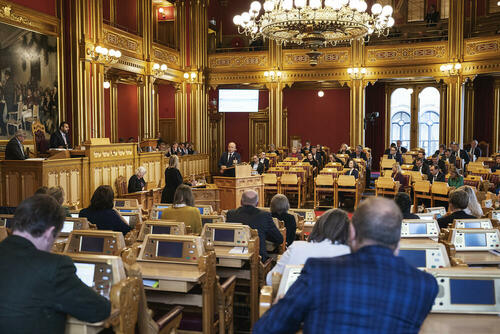Politics and not the decision bases counts in political decision-making, and many projects are continued even though studies show that they are economically unprofitable.
This is revealed in a new report in which TØI researchers have conducted in-depth interviews with 20 top politicians from across the political spectrum and who have experience with the QA scheme through their roles in the government apparatus or as parliamentary representatives.
The answers provide unique insight into how the investigation regime is experienced by decision-makers.
Norwegian public investment projects must be assessed before they are implemented, and the larger a project is, the better they must be investigated. The purpose of the Norwegian scheme for quality assurance of major public investments (QA Regime) is to ensure that large state investments provide the greatest possible benefit to society and ensure good control of costs, efficient use of common resources and, as far as possible. In other words, to ensure that the politicians choose the best solution to the problem they want to solve. It also ensures that the project has good cost control and that it is carried out in an efficient manner.
The decision bases are quality assured by independent consultants and/or researchers and documented in reports that follow a set template. This has been determined by the politicians themselves, and the report examines the extent to which the decision bases are used when decisions are made.
The reports are read and understood very differently
The analyses show that the decision bases are read to varying degrees by the different informants. How carefully they are read depends partly on several factors, such as how controversial the projects discussed are in terms of, for example, the amount of critical media attention they receive. Most informants read the abstracts and/or conclusions, while some read the reports from the first to the last page. Some rely primarily on summaries from their own bureaucrats if they are in government. Furthermore, politicians use many other sources to get information as well.
The understanding of the reports varies widely. Politicians generally have a high level of trust in the professional bases and the bureaucrats and consultants who prepare it, and they feel that the studies have a disciplinary effect and lead to better decisions and projects.
Considerations other than academic knowledge are decisive for political decisions
In the study, the politicians are clear that there are considerations other than the professional bases that are decisive for their political decisions, especially in the transport sector. For example, many projects are continued despite the fact that studies show that they are economically unprofitable.
There were divergent opinions as to when decisions are actually made, and the informants interpreted and answered the question differently. The decision-making process has many ‘stopping points’, and a project can be stopped at just about any stage until it has obtained funding. However, several point out that decisions, for example about what kind of projects are chosen, are in reality often made early in the process, after a conceptual appraisal and before an QA assessment is conducted.
The prospect of large cost increases can nevertheless lead to some very socio-economically unprofitable projects being rejected. Moreover, several projects are modified, investigated better, scaled down and postponed. There is also a tendency for the reports to be used to support the views that politicians and other stakeholders already have. For example, a QA with an assessment of net positive benefit to society is highlighted by those who want a project to be implemented. In contrast, politicians and others who want a project to be stopped, highlight the net negative social benefit of a project. If politicians disagree with the assessments in a cost-benefit analysis, they will often try to find weaknesses in it, for example, by questioning the underlying assumptions.
"It is the political calculation that decides," says one of the politicians interviewed in the report.
The assessments can be made more relevant
A better professional basis for decision-making can help politicians make good decisions. Improvements in the socio-economic analyses, for example by setting a price on natural values, or better dissemination of the results so that the politicians see what considerations are included in the calculations, are measures that may be relevant.
At the same time, there are indications that the challenges are not just about the content of the reports, but how the decision-making process takes place, influenced by various groups within the different sectors who are fighting for the same budgets. The responsibility is distributed among many actors, resulting in fragmentation of responsibility.
The report is part of a research project for the Concept program at NTNU.
For more information read the report: Top politicians' use of the decision-making basis for large state investments - Concept report no. 72. Authors: Inga Margrete Ydersbond, Andreas Kokkvoll Tveit, Tom Christensen and Askill Harkjerr Halse
Photo: Stortinget/Flickr.com






